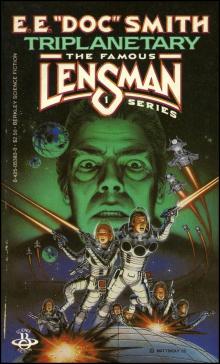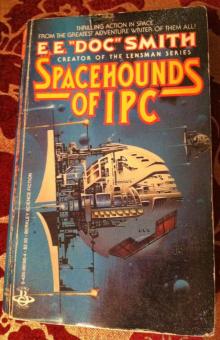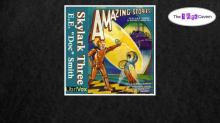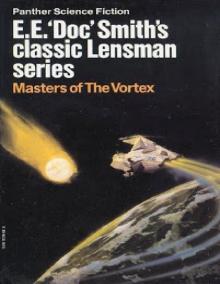- Home
- E. E. Smith
Spacehounds of IPC
Spacehounds of IPC Read online
Produced by Robert Cicconetti, Greg Weeks, David Garciaand the Online Distributed Proofreading Team athttps://www.pgdp.net
_Beginning a thrilling New Serial of Interplanetary Life and Travel byEdward E. Smith, Ph.D._
_Author of "Skylark of Space" and "Skylark Three"_
Spacehounds of IPC
_A good many of us, who are now certain beyond a doubt that space travel will forever remain in the realm of the impossible, probably would, if a rocket that were shot to the moon, for instance, did arrive, and perhaps return to give proof of its safe arrival on our satellite, accept the phenomenon in a perfectly blase, twentieth century manner. Dr. Smith, that phenomenal writer of classic scientific fiction, seems to have become so thoroughly convinced of the advent of interplanetary travel that it is difficult for the reader to feel, after finishing "Spacehounds of IPC," that travel in the great spaces is not already an established fact. Dr. Smith, as a professional chemist, is kept fairly busy. As a writer, he is satisfied with nothing less than perfection. For that reason, a masterpiece from his pen has become almost an annual event. We know you will like "Spacehounds" even better than the "Skylark" series._
Illustrated by WESSO
CHAPTER I
The IPV _Arcturus_ Sets Out for Mars
A narrow football of steel, the Interplanetary Vessel _Arcturus_ stoodupright in her berth in the dock like an egg in its cup. A hundred feetacross and a hundred and seventy feet deep was that gigantic bowl, itswalls supported by the structural steel and concrete of the dock andlined with hard-packed bumper-layers of hemp and fibre. High into theair extended the upper half of the ship of space--a sullen gray expanseof fifty-inch hardened steel armor, curving smoothly upward to a needleprow. Countless hundred of fine vertical scratches marred every inchof her surface, and here and there the stubborn metal was grooved andscored to a depth of inches--each scratch and score the record of anattempt of some wandering cosmic body to argue the right-of-way withthe stupendous mass of that man-made cruiser of the void.
A burly young man made his way through the throng about the entrance,nodded unconcernedly to the gatekeeper, and joined the stream ofpassengers flowing through the triple doors of the double air-lockand down a corridor to the center of the vessel. However, instead ofentering one of the elevators which were whisking the passengers up totheir staterooms in the upper half of the enormous football, he in someway caused an opening to appear in an apparently blank steel wall andstepped through it into the control room.
"Hi, Breck!" the burly one called, as he strode up to the instrument-deskof the chief pilot and tossed his bag carelessly into a corner. "Beholdyour computer in the flesh! What's all this howl and fuss about poorcomputation?"
"Hello, Steve!" The chief pilot smiled as he shook hands cordially."Glad to see you again--but don't try to kid the old man. I'm simpleenough to believe almost anything, but some things just aren't beingdone. We have been yelling, and yelling hard, for trained computersever since they started riding us about every one centimeter change inacceleration, but I know that you're no more an I-P computer than I ama Digger Indian. They don't shoot sparrows with coast-defense guns!"
"Thanks for the compliment, Breck, but I'm your computer for this trip,anyway. Newton, the good old egg, knows what you fellows are up againstand is going to do something about it, if he has to lick all the rest ofthe directors to do it. He knew that I was loose for a couple of weeksand asked me to come along this trip to see what I could see. I'm tocheck the observatory data--they don't know I'm aboard--take the peaksand valleys off your acceleration curve, if possible, and report toNewton just what I find out and what I think should be done about it.How early am I?" While the newcomer was talking, he had stripped thecovers from a precise scale model of the solar system and from a largeand complicated calculating machine and had set to work without a wastedmotion or instant--scaling off upon the model the positions of thevarious check-stations and setting up long and involved integrals andequations upon the calculator.
The older man studied the broad back of the younger, bent over hiscomputations, and a tender, almost fatherly smile came over his carewornface as he replied:
"Early? You? Just like you always were--plus fifteen seconds on thedeadline. The final dope is due right now." He plugged the automaticrecorder and speaker into a circuit marked "Observatory," waited untila tiny light above the plug flashed green, and spoke.
"IPV _Arcturus_; Breckenridge, Chief Pilot; trip number forty-threetwenty-nine. Ready for final supplementary route and flight data, Tellusto Mars."
"Meteoric swarms still too numerous for safe travel along the scheduledroute," came promptly from the speaker. "You must stay further away fromthe plane of the ecliptic. The ether will be clear for you along routeE2-P6-W41-K3-R19-S7-M14. You will hold a constant acceleration of 981.27centimeters between initial and final check stations. Your take-offwill be practically unobstructed, but you will have to use the utmostcaution in landing upon Mars, because in order to avoid a weightlessdetour and a loss of thirty-one minutes, you must pass very closeto both the Martian satellites. To do so safely you must pass thelast meteorological station, M14, on schedule time plus or minus fiveseconds, at scheduled velocity plus or minus ten meters, with exactlythe given negative acceleration of 981.27 centimeters, and exactly uponthe pilot ray M14 will have set for you."
"All x." Breckenridge studied his triplex chronometer intently, thenunplugged and glanced around the control room, in various parts of whichhalf a dozen assistants were loafing at their stations.
"Control and power check-out--Hipe!" he barked. "Driving converters andprojectors!"
The first assistant scanned his meters narrowly as he swung amulti-point switch in a flashing arc. "Converter efficiency 100,projector reactivity 100; on each of numbers one to forty-fiveinclusive. All x."
"Dirigible projectors!"
* * * * *
Two more gleaming switches leaped from point to point. "Converterefficiency 100, projector reactivity 100, dirigibility 100, on each ofnumbers one to thirty-two, inclusive, of upper band; and numbers one tothirty-two, inclusive, of lower band. All x."
"Gyroscopes!"
"35,000. Drivers in equilibrium at ten degrees plus. All x."
"Upper lights and lookout plates!"
The second assistant was galvanized into activity, and upon a screenbefore him there appeared a view as though he were looking directlyupward from the prow of the great vessel. The air above them was full ofaircraft of all shapes and sizes, and occasionally the image of one ofthat flying horde flared into violet splendor upon the screen as it wascaught in the mighty, roving beam of one of the twelve ultra-lightprojectors under test.
"Upper lights and lookout plates--all x," the second assistant reported,and other assistants came to attention as the check-out went on.
"Lower lights and lookout plates!"
"All x," was the report, after each of the twelve ultra-lights of thestern had swung around in its supporting brackets, illuminating everyrecess of the dark depths of the bottom well of the berth and throwingthe picture upon another screen in lurid violet relief.
"Lateral and vertical detectors!"
"Laterals XP2710--all x. Verticals AJ4290--all x."
"Receptors!"
"15,270 kilofranks--all x."
"Accumulators!"
"700,000 kilofrank-hours--all x."
Having thus checked and tested every function of his department,Breckenridge plugged into "Captain," and when the green light went on:
"Chief pilot check-out--all x," he reported briefly.
"All x," acknowledged the speaker, and the chief pilot unplugged.Fifteen minutes remained, during
which time one department head afteranother would report to the captain of the liner that everything in hischarge was ready for the stupendous flight.
"All x, Steve?" Breckenridge turned to the computer. "How do you checkacceleration and power with the observatory?"
"Not so good, old bean," the younger man frowned in thought. "Theyfigure like astronomers, not navigators. They've made no allowances foranything, not even the reversal--and I figure four thousands for thatand for minor detours. Then there's check station errors...."
"Check-station errors! Why, they're always right--that's what they'refor!"
"Don't fool yourself--they've got troubles of their own, the same asanybody else. In fact, from a study of the charts of the last few weeks,I'm pretty sure that E2 is at least four thousand kilometers this sideof where he thinks he is, that W41 is ten or twelve thousand beyond hisstation, and that they've both got a lateral displacement that's simplyfierce. I'm going to check up, and argue with them about it as we pass.Then there's another thing--they figure to only two places, and we'vegot to have the third place almost solid if we expect to get a smoothcurve. A hundredth of a centimeter of acceleration means a lot on a longtrip when they're holding us as close as they are doing now. We'll ridethis trip on 981.286 centimeters--with our scheduled mass, that meansthirty six points of four seven kilofranks _plus_ equilibrium power. Allset to go," the computer stated, as he changed, by fractions of arc, thecourse-plotters of the automatic integrating goniometer.
"You're the doctor--but I'm glad it's you that'll have to explain to theobservatory," and Breckenridge set his exceedingly delicate excess powerpotentiometer exactly upon the indicated figure. "Well, we've got a fewminutes left for a chin-chin before we lift her off."
"What's all this commotion about? Dish out the low-down."
"Well, it's like this, Steve. We pilots are having one sweettime--we're being growled at on every trip. The management squawks ifwe're thirty seconds plus or minus at the terminals, and the passengerdepartment squalls if we change acceleration five centimeters total enroute--claims it upsets the dainty customers and loses business forthe road. They're tightening up on us all the time. A couple of yearsago, you remember, it didn't make any difference what we did with theacceleration as long as we checked in somewhere near zero time--we usedto spin 'em dizzy when we reversed at the half-way station--but thatkind of stuff doesn't go any more. We've got to hold the accelerationconstant and close to normal, got to hold our schedule on zero, _plus_or _minus_ ten seconds, and yet we've got to make any detours theytell us to, such as this seven-million kilometer thing they handedus just now. To make things worse, we've got to take orders at everycheck-station, and yet _we_ get the blame for everything that happensas a consequence of obeying those orders! Of course, I know as wellas you do that it's rotten technique to change acceleration at everycheck-station; but we've told 'em over and over that we can't do anybetter until they put a real computer on every ship and tell thecheck-stations to report meteorites and other obstructions to us andthen to let us alone. So you'd better recommend us some computers!"
"You're getting rotten computation, that's a sure thing, and I don'tblame you pilots for yelling, but I don't believe that you've got theright answer. I can't help but think that the astronomers are lying downon the job. They are so sure that you pilots are to blame that it hasn'toccurred to them to check up on themselves very carefully. However,we'll know pretty quick, and then we'll take steps."
"I hope so--but say, Steve, I'm worried about using that much plusequilibrium power. Remember, we've got to hit M14 in absolutely goodshape, or plenty heads will drop."
"I'll say they will. I know just how the passengers will howl if wehold them weightless for half an hour, waiting for those two moons to getout of the way, and I know just what the manager will do if we check inminus thirty-one minutes. Wow! He'll swell up and bust, sure. But don'tworry, Breck--if we don't check in all right, anybody can have my headthat wants it, and I'm taking full responsibility, you know."
"You're welcome to it." Breckenridge shrugged and turned theconversation into a lighter vein. "Speaking of weightlessness,it's funny how many weight-fiends there are in the world, isn'tit? You'd think the passengers would enjoy a little weightlessnessoccasionally--especially the fat ones--but they don't. But say, whileI think of it, how come you were here and loose to make this check-up?I thought you were out with the other two of the Big Three, solvingall the mysteries of the Universe?"
"Had to stay in this last trip--been doing some work on the ether,force-field theory, and other advanced stuff that I had to go to Marsand Venus to get. Just got back last week. As for solving mysteries,laugh while you can, old hyena. You and a lot of other dim bulbs thinkthat Roeser's Rays are the last word--that there's nothing left todiscover--are going to get jarred loose from your hinges one of thesedays. When I came in nine months ago they were hot on the trail ofsomething big, and I'll bet they bring it in...."
Out upon the dock an insistent siren blared a crescendo and diminuendoblast of sound, and two minutes remained. In every stateroom and inevery lounge and saloon speakers sounded a warning:
"For a short time, while we are pulling clear of the gravitational fieldof the Earth, walking will be somewhat difficult, as everything on boardwill apparently increase in weight by about one-fifth of its presentamount. Please remain seated, or move about with caution. In about anhour weight will gradually return to normal. We start in one minute."
"Hipe!" barked the chief pilot as a flaring purple light sprang intobeing upon his board, and the assistants came to attention at theirstations. "Seconds! Four! Three! Two! One! LIFT!" He touched abutton and a set of plunger switches drove home, releasing into theforty-five enormous driving projectors the equilibrium power--thefifteen-thousand-and-odd kilofranks of energy that exactlycounterbalanced the pull of gravity upon the mass of the cruiser.Simultaneously there was added from the potentiometer, already setto the exact figure given by the computer, the _plus_-equilibriumpower--which would not be changed throughout the journey if the idealacceleration curve were to be registered upon the recorders--and theimmense mass of the cruiser of the void wafted vertically upward at alow and constant velocity. The bellowing, shrieking siren had clearedthe air magically of the swarm of aircraft in her path, and quietly,calmly, majestically, the _Arcturus_ floated upward.
* * * * *
Breckenridge, sixty seconds after the initial lift, actuated the systemof magnetic relays which would gradually cut in the precisely measured"starting power," which it would be necessary to employ for sixty-nineminutes--for, without the acceleration given by this additional power,they would lose many precious hours of time in covering merely thefew thousands of miles during which Earth's attraction would operatepowerfully against their progress.
Faster and faster the great cruiser shot upward as more and more of thestarting power was released, and heavier and heavier the passengersfelt themselves become. Soon the full calculated power was on and theacceleration became constant. Weight no longer increased, but remainedconstant at a value of plus twenty three and six-tenths percent. For afew moments there had been uneasy stomachs among the passengers--perhapsa few of the first-trippers had been made ill--but it was not much worsethan riding in a high-speed elevator, particularly since there was nochange from positive to negative acceleration such as is experienced inexpress elevators.
The computer, his calculations complete, watched the pilot withinterest, for, accustomed as he was to traversing the depths of space,there was a never-failing thrill to his scientific mind in the delicacyand precision of the work which Breckenridge was doing--work which couldbe done only by a man who had had long training in the profession andwho was possessed of instantaneous nervous reaction and of the highestdegree of manual dexterity and control. Under his right and left handswere the double-series potentiometers actuating the variable-speeddrives of the flight-angle directors in the hour and declination ranges;before his eyes was
the finely marked micrometer screen upon which theguiding goniometer threw its needle-point of light; powerful opticalsystems of prisms and lenses revealed to his sight the director-angles,down to fractional seconds of arc. It was the task of the chief pilotto hold the screened image of the cross-hairs of the two directors insuch position relative to the ever-moving point of light as to hold themighty vessel precisely upon its course, in spite of the complex systemof forces acting upon it.
For almost an hour Breckenridge sat motionless, his eyes flashing frommicrometer screen to signal panel, his sensitive fingers moving thepotentiometers through minute arcs because of what he saw upon thescreen and in instantaneous response to the flashing, multi-coloredlights and tinkling signals of his board. Finally, far from earth, themoon's attraction and other perturbing forces comparatively slight, thesignals no longer sounded and the point of light ceased its irregularmotion, becoming almost stationary. The chief pilot brought bothcross-hairs directly upon the brilliant point, which for some time theyhad been approaching more and more nearly, adjusted the photo-cellsand amplifiers which would hold them immovably upon it, and at thecalculated second of time, cut out the starting power by means ofanother set of automatically timed relays. When only the regular drivingpower was left, and the acceleration had been checked and found to beexactly the designated value of 981.286 centimeters, he stood up andheaved a profound sigh of relief.
"Well, Steve, that's over with--we're on our way. I'm always glad whenthis part of it is done."
"It's a ticklish job, no fooling--even for an expert," the mathematicianagreed. "No wonder the astronomers think you birds are the ones who aregumming up their dope. Well, it's about time to plug in on E2. Here'swhere the fireworks start!" He closed the connections which transferredthe central portion of the upper lookout screen to a small micrometerscreen at Breckenridge's desk and plugged it into the firstcheck-station. Instantly a point of red light, surrounded by a vividorange circle, appeared upon the screen, low down and to the left ofcenter, and the timing galvanometer showed a wide positive deflection.
"Hashed again!" growled Breckenridge. "I must be losing my grip,I guess. I put everything I had on that sight, and missed it tendivisions. I think I'll turn in my badge--I've cocked our perfect curvealready, before we got to the first check-station!" His hands movedtoward the controls, to correct their course and acceleration.
"As you were--hold everything! Lay off those controls!" snapped thecomputer. "There's something screwy, just as I thought--and it isn'tyou, either. I'm no pilot, of course, but I do know good compensationwhen I see it, and if you weren't compensating that point I never saw itdone. Besides, with your skill and my figures I know darn well that wearen't off more than a tenth of one division. He's cuckoo! Don't callhim--let him start it, and refer him to me."
"All x--I'll be only too glad to pass the buck. But I still think,Steve, that you're playing with dynamite. Who ever heard of anastronomer being wrong?"
"You'd be surprised," grinned the physicist, "Since this fuss hasjust started, nobody has tried to find out whether they were wrongor not...."
"IPV _Arcturus_, attention!" came from the speaker curtly.
"IPV _Arcturus_, Breckenridge," from the chief pilot.
"You have been on my ray almost a minute. Why are you not correctingcourse and acceleration?"
"Doctor Stevens is computing us and has full control of course andacceleration," replied Breckenridge. "He will answer you."
"I am changing neither course nor acceleration because you are notin position," declared Stevens, crisply, "Please give me your presentsupposed location, and your latest precision goniometer bearings on thesun, the moon, Mars, Venus, and your Tellurian reference limb, withexact time of observations, gyroscope zero-planes, and goniometerfactors!"
"Correct at once or I shall report you to the Observatory," E2 answeredloftily, paying no attention to the demand for proof of position.
"Be sure you do that, guy--and while you're at it report that yourstation hasn't taken a precision bearing in a month. Report that you'vebeen muddling along on radio loop bearings, and that you don't knowwhere you are, within seven thousand kilometers. And speaking ofreporting--I know already that a lot of you astronomical guessershave only the faintest possible idea of where you really are, _plus_,_minus_, or lateral; and if you don't get yourselves straightened outbefore we get to W41, I'm going to make a report on my own account thatwill jar some of you birds loose from your upper teeth!" He unpluggedwith a vicious jerk, and turned to the pilot with a grin.
"Guess that'll hold him for a while, won't it?"
"He'll report us, sure," remonstrated Breckenridge. The older man wasplainly ill at ease at this open defiance of the supposedly infalliblecheck-stations.
"Not that baby," returned the computer confidently. "I'll bet you asmall farm against a plugged nickel that right now he's working hisgoniometer so hard that it's pivots are getting hot. He'll sneak backinto position as soon as he can calculate his results, and pretend he'salways been there."
"The others will be all right, then, probably, by the time we get tothem?"
"Gosh, no--you're unusually dumb today, Breck. He won't tell anybodyanything--he doesn't want to be the only goat, does he?"
"Oh, I see. How could you dope this out, with only the recorder charts?"
"Because I know the kind of stuff you pilots are--and those humps arealtogether too big to be accounted for by anything I know about you.Another thing--the next station, P6, I think is keeping himself all x.If so, when you corrected for E2, which was wrong, it'd throw you alloff on P6, which was right, and so on--a bad hump at almost everycheck-station. See?"
* * * * *
True to prediction, the pilot ray of P6 came in almost upon the exactcenter of the micrometer screen, and Breckenridge smiled in relief as hebegan really to enjoy the trip.
"How do we check on chronometers?" asked P6 when Stevens had beenintroduced. "By my time you seem to be about two and a half seconds_plus_?"
"All x--two points four seconds plus--we're riding on 981.286centimeters, to allow for the reversal and for minor detours. Bye."
"All this may have been coincidence, Breck, but we'll find out prettyquick now," the computer remarked when the flying vessel was nearingthe third check-station. "Unless I'm all out of control we'll check inalmost fourteen seconds minus on W41, and we may not even find him onthe center block of the screen."
When he plugged in W41 was on the block, but was in the extreme upperright corner. They checked in thirteen and eight-tenths seconds minus onthe station, and a fiery dialogue ensued when the computer questionedthe accuracy of the location of the station and refused point-blank tocorrect his course.
"Well, Breck, old onion, that tears it," Stevens declared as heunplugged. "No use going any further on these bum reference points.I'm going to report to Newton--he'll rock the Observatory on itsfoundations!" He plugged into the telegraph room. "Have you got a freehigh-power wave?... Please put me on Newton, in the main office."
Moving lights flashed and flickered for an instant upon the communicatorscreen, settling down into a white glow which soon resolved itself intothe likeness of a keen-eyed, gray-haired man, seated at his desk in theremote office of the Interplanetary Corporation. Newton smiled as herecognized the likeness of Stevens upon his own screen, and greeted himcordially.
"Have you started your investigation, Doctor Stevens?"
"Started it? I've finished it!" and Stevens tersely reported what hehad learned, concluding: "So you see, you don't need special computerson these ships any more than a hen needs teeth. You've got all thecomputers you need, in the observatories--all you've got to do is makethem work at their trade."
"The piloting was all x, then?"
"Absolutely--our curve so far is exactly flat ever since we cutoff the starting power. Of course, all the pilots can't be as good asBreckenridge, but give them good computation and good check points andyou shouldn't get any humps
higher than about half a centimeter."
"They'll get both, from now on," the director assured him. "Thanks. Ifyour work for the trip is done, you might show my little girl, Nadia,around the _Arcturus_. She's never been out before, and will beinterested. Would you mind?"
"Glad to, Mr. Newton--I'll be a regular uncle to her."
"Thanks again, Operator, I'll speak to Captain King, please."
"Pipe down that guff, you unlicked cub, or I'll crown you with aproof-bar!" the chief pilot growled, as soon as Stevens had unplugged.
"You and who else?" retorted the computer, cheerfully. "Pipe downyourself, guy--if you weren't so darn dumb and didn't have such acomplex, you'd know that you're the crack pilot of the outfit andwouldn't care who else knew it." Stevens carefully covered and put awaythe calculating machine and other apparatus he had been using and turnedagain to the pilot.
"I didn't know Newton had any kids, especially little ones, or I'd havegot acquainted with them long ago. Of course I don't know him very well,since I never was around the office much, but the old tiger goes overbig with me."
"Hm--m. Think you'll enjoy playing nursemaid all the rest of the trip?"Breckenridge asked caustically, but with an enigmatic smile.
"Think so? I _know_ so!" replied Stevens, positively. "I always didlike kids, and they always did like me--we fall for each other like tenthousand bricks falling down a well. Why, a kid--_any_ kid--and I teamup just like grace and poise.... What's gnawing on you anyway, to makeyou turn Cheshire cat all of a sudden? By the looks of that grin I'dsay you had swallowed a canary of mine some way or other; but darned ifI know that I've lost any," and he stared at his friend suspiciously.
"To borrow your own phrase, Steve, 'You'd be surprised,'" andBreckenridge, though making no effort to conceal his amusement, wouldsay no more.
In a few minutes the door opened, and through it there stepped agrizzled four-striper. Almost hidden behind his massive form there wasa girl, who ran up to Breckenridge and seized both his hands, her eyessparkling.
"Hi, Breckie, you old darling! I knew that if we both kept afterhim long enough Dad would let me ride with you sometime. Isn't this_gorgeous_?"
Stevens was glad indeed that the girl's enthusiastic greeting of thepilot was giving him time to recover from his shock, for DirectorNewton's "little girl, Nadia" was not precisely what he had led himselfto expect. Little she might be, particularly when compared with thegiant frame of Captain King, or with Steve's own five-feet-eleven ofstature and the hundred and ninety pounds of rawhide and whalebone thatwas his body, but child she certainly was not. Her thick, fair hair,cut in the square bob that was the mode of the moment, indicated thatNature had intended her to be a creamy blonde, but as she turned to beintroduced to him, Stevens received another surprise--for she was oneof those rare, but exceedingly attractive beings, a natural blonde withbrown eyes and black eyebrows. Sun and wind had tanned her satin skinto a smooth and even shade of brown, and every movement of her lithe andsupple body bespoke to the discerning mind a rigidly-trained physique.
"Doctor Stevens, you haven't met Miss Newton, I hear," the captainintroduced them informally. "All the officers who are not actually tieddown at their posts are anxious to do the honors of the vessel, but asI have received direct orders from the owners, I am turning her over toyou--you are to show her around."
"Thanks, Captain, I won't mutiny a bit against such an order. I'm mightyglad to know you, Miss Newton."
"I've heard a lot about you, Doctor. Dad and Breckie here are alwaystalking about the Big Three--what you have done and what you are goingto do. I want to meet Doctor Brandon and Doctor Westfall, too," and herhand met his in a firm and friendly clasp. She turned to the captain,and Stevens, noticing that the pilot, with a quizzical expression, wasabout to say something, silenced him with a fierce aside.
"Clam it, ape, or I'll climb up you like a squirrel!" he hissed, and thegrinning Breckenridge nodded assent to this demand for silenceconcerning children and nursemaids.
"Since you've never been out, Miss Newton, you'll want to see the wholeworks," Stevens addressed the girl. "Where do you want to begin? Shallwe start at the top and work down?"
"All right with me," she agreed, and fell into step beside him. She wasdressed in dove-gray from head to foot--toque, blouse, breeches, heavystockings, and shoes were of the one shade of smooth, lustrous silk; andas they strolled together down the passage-way, the effortless ease andperfect poise of her carriage called aloud to every hard-schooled fibreof his own highly-trained being.
"We're a lot alike you and I--do you know it?" he asked, abruptly andunconventionally.
"Yes, I've felt it, too," she replied frankly, and studied him withoutaffectation. "It has just come to me what it is. We're both in finecondition and in hard training. You're an athlete of some kind, and I'msure you're a star--I ought to recognize you, but I'm ashamed to say Idon't. What do you do?"
"Swim."
"Oh, of course--Stevens, the great Olympic high and fancy diver! I would_never_ have connected our own Doctor Stevens, the eminent mathematicalphysicist, with the King of the Springboard. Say, ever since I quitbeing afraid of the water I've had a yen to do that two-and-a-half twistof yours, but I never met anybody who knew it well enough to teach itto me, and I've almost broken my back forty times trying to learn italone!"
"I've got you, now, too--American and British Womens' golf champion.Shake!" and the two shook hands vigorously, in mutual congratulation."Tell you what--I'll give you some pointers on diving, and you can showme how to make a golf ball behave. Next to Norman Brandon, I've gotthe most vicious hook in captivity--and Norm can't help himself. He'sleft-handed, you know, and, being a southpaw, he's naturally wild. Heslices all his woods and hooks all his irons. I'm consistent, anyway--Ihook everything, even my putts."
"It's a bargain! What do you shoot?"
"Pretty dubby. Usually in the middle eighties--none of us play much,being out in space most of the time, you know--sometimes, when my hookis going particularly well, I go up into the nineties."
"We'll lick that hook," she promised, as they entered an elevator andwere borne upward, toward the prow of the great interplanetary cruiser.

 The Galaxy Primes
The Galaxy Primes Triplanetary
Triplanetary Spacehounds of IPC
Spacehounds of IPC Skylark Three
Skylark Three The Vortex Blaster
The Vortex Blaster Subspace Survivors
Subspace Survivors